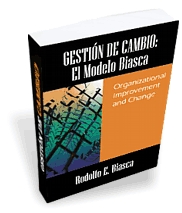Unique Change Management Textbook for Spanish-Speaking Graduate Students and Practitioners. New Edition.
Gestion de Cambio (Organizational Change). This text-book, written in Spanish, will help your company to change- whether it is a gradual and incremental or the wholesale transformation of your business processes, organizational behavior or corporate direction- and retain competitiveness.

Littleton, CO, November 09, 2005 --(PR.com)-- Gestión de Cambio: El Modelo Biasca
R. Biasca is an argentine professor and international consultant. He has published several books in the last 30 years in the corporate improvement and renewal fields. He has taught in 66 universities in 21 countries and there is no Spanish speaking author that has published so extensively in the business transformation subject.
This new book is a textbook for graduate students and practitioners, full of cases and examples of more than 50 countries. There is nothing similar written in Iberamerica.
Different studies have demonstrated that change efforts results are less than satisfactory. Therefore, a comprehensive, interdisciplinary and practical three-phase model is proposed (known in Latin America as the “Biasca’s Model). The purpose is to determine the precise transformation that can improve results substantially.
The three phases are:
– Competitive Assessment.
After analyzing the environment and the firm, the competitive deterioration is estimated to determine how much change is needed and how much time is available to make the change.
– Innovation..
After an exhaustive study of change approaches, research on the subject and managerial experience a general business transformation “formula” is derived. For each competitive situation the formula is different (and usually different names are used to mention it). The formula is a set of innovation projects with different priorities and impact.
– Execution.
To transform ideas in concrete results at least four aspects need to be considered: the necessary implementation steps, how to modify human and firm behavior, the competitive position and the country where the organization is located.
Most Latin American managers assume that what is true for Americans working in the United States is also true for people from other countries. Sometimes it is not. Cross-cultural management applied to change management concepts is a new field relative to the traditional study of management. The book makes emphasis in this point.
###
R. Biasca is an argentine professor and international consultant. He has published several books in the last 30 years in the corporate improvement and renewal fields. He has taught in 66 universities in 21 countries and there is no Spanish speaking author that has published so extensively in the business transformation subject.
This new book is a textbook for graduate students and practitioners, full of cases and examples of more than 50 countries. There is nothing similar written in Iberamerica.
Different studies have demonstrated that change efforts results are less than satisfactory. Therefore, a comprehensive, interdisciplinary and practical three-phase model is proposed (known in Latin America as the “Biasca’s Model). The purpose is to determine the precise transformation that can improve results substantially.
The three phases are:
– Competitive Assessment.
After analyzing the environment and the firm, the competitive deterioration is estimated to determine how much change is needed and how much time is available to make the change.
– Innovation..
After an exhaustive study of change approaches, research on the subject and managerial experience a general business transformation “formula” is derived. For each competitive situation the formula is different (and usually different names are used to mention it). The formula is a set of innovation projects with different priorities and impact.
– Execution.
To transform ideas in concrete results at least four aspects need to be considered: the necessary implementation steps, how to modify human and firm behavior, the competitive position and the country where the organization is located.
Most Latin American managers assume that what is true for Americans working in the United States is also true for people from other countries. Sometimes it is not. Cross-cultural management applied to change management concepts is a new field relative to the traditional study of management. The book makes emphasis in this point.
###
Contact
R. Biasca & Asociados
Rodolfo E. Biasca
303 386 3524
www.biasca.com
Rodolfo E. Biasca
303 386 3524
www.biasca.com
Categories

